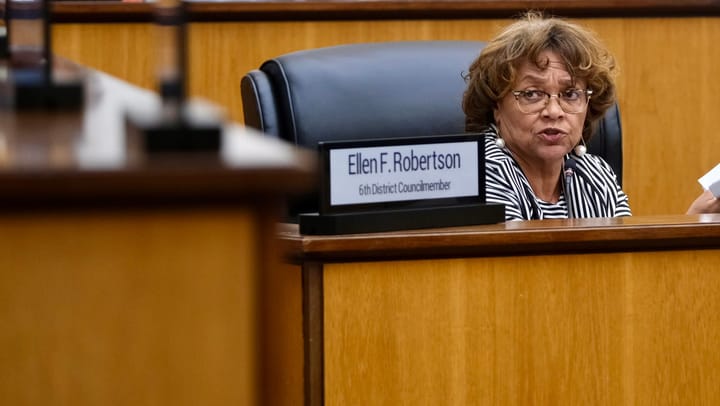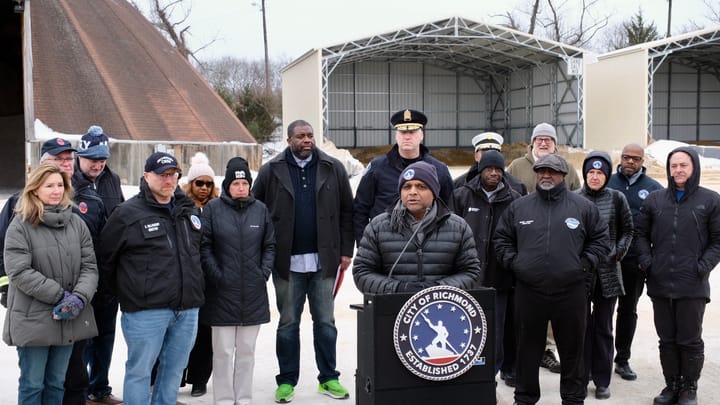
Judge postpones FOIA ‘whistleblower’ trial as hostilities continue over witnesses and documents
Less than a week before the start of a high-profile court trial about City Hall transparency, a Richmond judge decided Thursday to postpone the case because of unanswered questions about whether the city has produced all relevant information.
Instead of starting next Tuesday, the three-day trial over the firing of former city Freedom of Information Act officer Connie Clay was pushed off until June of 2026, a delay of at least nine months.
Circuit Court Judge Claire G. Cardwell said she knew the decision to cancel next week’s trial was frustrating for everyone involved, but she felt it was necessary in order to give Clay her day in court with a complete set of facts for jurors.
The judge faulted both sides for the delay, saying the lawyers involved have been unable to follow basic legal procedures without the court repeatedly having to intervene to settle disputes.
“The dynamics between the counsel in this case have caused things to be delayed in sort of an untenable fashion,” Cardwell said. “It frankly has felt sometimes a lot more like refereeing than judging.”
How the lengthy, eleventh-hour delay might impact the case is unclear. But it will continue to drive up the city’s legal bills in a lawsuit that’s already cost hundreds of thousands of dollars. Instead of being handled by the city’s own lawyers, Richmond brought in an outside legal team from the Ogletree Deakins law firm.
In a brief statement after the judge’s decision, Clay said she’s grateful for Cardwell’s “thoughtfulness” and is looking forward to a jury of Richmonders deciding the case.
When asked how much the city has already spent on the outside lawyers, officials said Thursday that the cost was $234,711. However, that number is almost certainly lower than the true cost, because it only covers Ogletree Deakins invoices sent as of May 31.
As part of the lawsuit, Ogletree Deakins objected to media coverage of the lawsuit's costs to the city and accused Clay of improperly obtaining the invoices through FOIA requests she filed with the city.
As of Sept. 10, Ogletree Deakins hadn't filed billing invoices with the city for the months of June, July and August, according to an email obtained by The Richmonder. There was extensive legal work on the case over the summer to prepare for the September trial, and presumably additional costs to the city not reflected in the $234,711 figure.
City officials could not answer questions Thursday about why the billing invoices ceased, and whether a decision was made to stop or delay the invoices so they could no longer be discoverable through FOIA requests.
Clay, an attorney with a background in family law, was hired to handle public-records requests for the city in the summer of 2023. She was fired in January of 2024. The lawsuit is focused on what brought her brief tenure to an end.
Clay alleges she was wrongfully fired for pointing out the city was violating FOIA law by delaying responses for no reason and refusing to release documents that she felt should have been released.
Because she was calling attention to wrongdoing, she argues, she was acting as a government whistleblower who should therefore have been protected from retaliation by her employer. Clay is seeking back pay of around $118,000 — lowered from her original request for $250,000 — and reinstatement to her former job.
The city is strongly disputing Clay’s version of events, arguing she was unqualified to make her own determinations about FOIA law and was let go for being a combative and difficult employee.
The Richmonder is powered by your donations. For just $9.99 a month, you can join the 1,000+ donors who are keeping quality local journalism alive in Richmond.
The case doesn’t revolve around the simple question of whether the city did or didn’t follow FOIA law. Instead, it focuses on the narrower and more nuanced question of whether Clay was punished as a direct result of making a “good faith” attempt to report wrongdoing or abuse.
Regardless of the legal outcome, the trial could offer a rare glimpse into City Hall’s internal disputes over being transparent with the public over several newsworthy topics like the 2024 meals tax controversy, Richmond’s efforts to get a casino and a fallen tree killing a city worker.
Clay — represented by employment attorney Sarah Robb — filed her lawsuit last November, but the process of preparing for trial has been anything but smooth.
Cardwell said she was particularly concerned that Clay’s attorneys say they’re aware of documents relevant to the case that haven’t been turned over by the city’s lawyers. Clay’s team said it got the additional documents through FOIA requests filed outside the scope of the litigation.
“It tells me there’s something wrong there,” Cardwell said, noting she wasn’t accusing anyone of intentionally hiding documents.
Cardwell seemed unsatisfied with the explanations from the city’s legal team that they’ve made a good-faith effort to search broadly for records and produced everything there is to produce.
“You don’t just dispose of things because you don’t think it’s important to their case,” the judge told the city’s attorneys.
She also discounted the notion that she and Clay’s attorneys should take the city’s word that there are no more communications to find without a more thorough search of all the city’s digital records.
“I could say I’ve never texted someone and I bet you could find in a phone that I did,” Cardwell said.
At one point in the lawsuit, the city said it would have to purchase costly software in order to do a full search of the city-issued phones that could have text messages about Clay or the reason she was fired.
Cardwell is planning to use one of the days set aside next week for the now-cancelled trial to regroup on unresolved issues in the case.
‘A simple matter of professionalism and courtesy’
The latest of many procedural disputes in the case centers on Robb’s inability to get a full deposition of former city spokeswoman Petula Burks, who was Clay’s boss.
The judge had ordered the city’s attorneys to make Burks available for a deposition on Sept. 9 and Sept. 10, when she was supposed to answer questions from Clay’s attorneys. The first day seemed to go according to plan, but Robb accused Ogletree Deakins attorney Jimmy Robinson of prematurely walking Burks out of the second day of the deposition because of a scheduling error with a court reporter who was supposed to take down a transcript.
The deposition was supposed to start at 9 a.m. According to Robb’s side of the story, Robinson said he would let Burks leave by 9:30 a.m. if there was still no court reporter. Robb said she arranged a virtual court reporter by 9:32 a.m., but by that time Burks was already gone.
Clay’s team is arguing that the resistance they’ve encountered has become so troublesome the judge should formally tell the jury the city has concealed information that could help Clay’s case.
Cardwell has not yet ruled on that request, but she made it clear Thursday that she wasn’t happy the deposition hadn’t happened according to what she had ordered. Robinson said it was the responsibility of Clay’s attorneys to arrange for a court reporter to be there for the second day of the deposition.
“They forgot to call her,” he said.
Cardwell asked why the city’s side couldn’t have waited as “a simple matter of professionalism and courtesy.”
“Things like that happen,” the judge said.
Robinson insisted he did wait, and characterized Robb’s attempts to question Burks as “badgering.”
“No one just walked out and left,” Robinson said.
Robb said the judge should consider a formal “sanction” against the city’s lawyers for their conduct in the case. In the city’s latest filing, the Ogletree Deakins team accused Robb and her co-counsel Helen Hardiman of “abusive litigation conduct,” saying Clay and her attorneys have acted with “hostility, incivility and disregard for the rules, only to throw up their hands and cry foul when met with the natural consequences of their own conduct.”
The judge also chastised the city’s attorneys for waiting until the last minute to file formal responses on motions the two sides were supposed to be dealing with at Thursday’s hearing. The hearing was at 9 a.m., and Cardwell said she didn’t get the city’s filings until 7 a.m.
Robinson apologized and said the documents had been filed at the courthouse late Wednesday.
“Why couldn’t you have emailed?” Cardwell said. “Why is it filed the day before the hearing?”
Even though the prospects of a settlement seem dim, Cardwell has ordered the two sides to at least go through the motions of a mediation process to see if there might be some other resolution. But even that process was a sticking point Thursday, with Robinson questioning whether it was worthwhile to explore mediation.
“My client has not agreed to mediate anything,” the city’s lawyer said.
The judge replied: “Your client doesn’t have to agree with what I’ve ordered to happen.”
Contact Reporter Graham Moomaw at gmoomaw@richmonder.org






